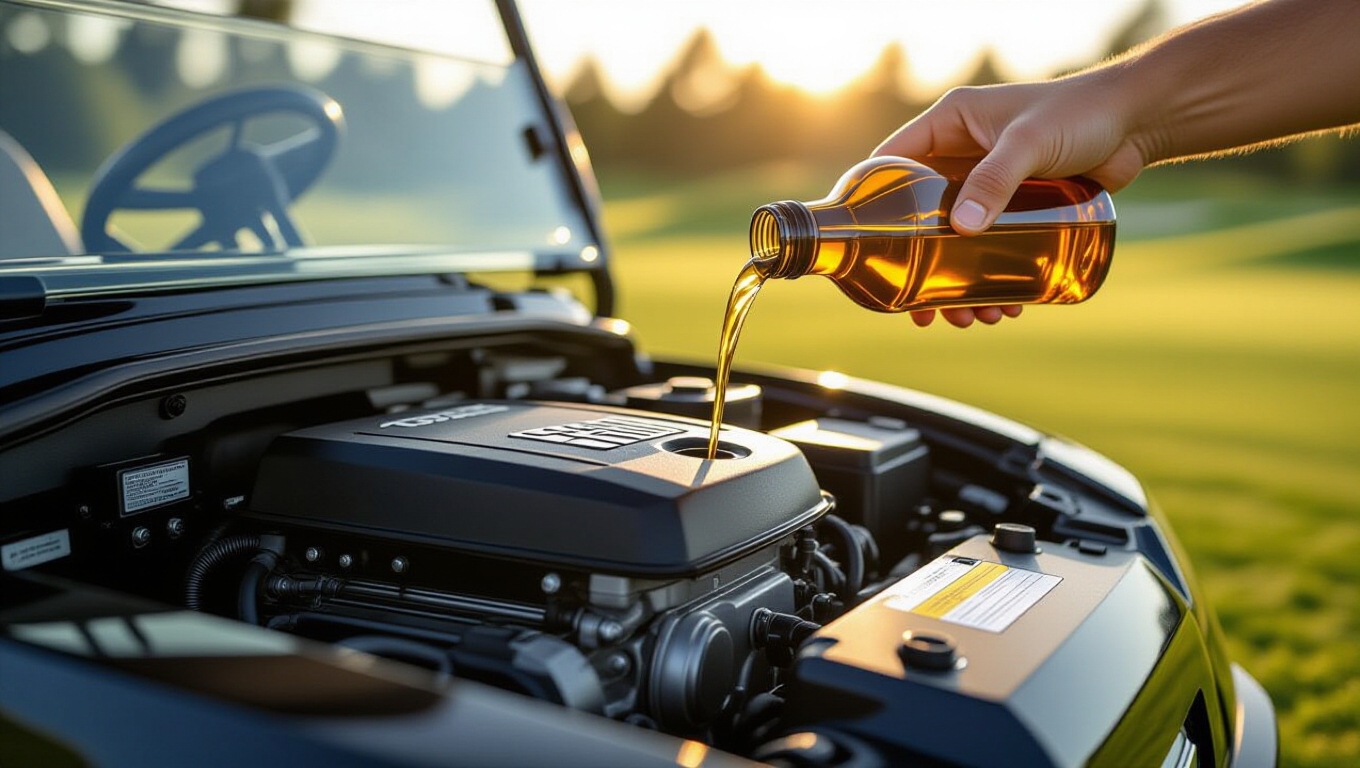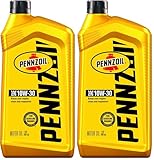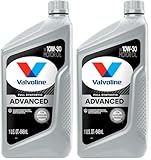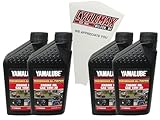Physical Address
304 North Cardinal St.
Dorchester Center, MA 02124
Physical Address
304 North Cardinal St.
Dorchester Center, MA 02124

To keep your golf cart smooth and powerful in 2026, choose from top oils like Mobil 1 Advanced Fuel Economy 0W-20 for fuel efficiency or Pennzoil Conventional 10W-30 for a budget option.
Castrol EDGE 10W-30 protects high-mileage carts, while Valvoline Advanced Synthetic offers all-weather durability. Yamaha’s Yamalube 10W-30 suits Yamaha engines perfectly. Picking the right oil depends on your cart’s needs, climate, and mileage.
Explore these factors to find your ideal match.
| Image | Name | Editor's Rating | Price |
|---|---|---|---|

|
Mobil 1 Advanced Fuel Economy Full Synth...
|
|
|

|
Pennzoil 10W-30 Motor Oil, 1-Quart | Con...
|
|
|

|
Castrol EDGE High Mileage 10W-30 Advance...
|
|
|

|
Valvoline Full Synthetic Motor Oil, 10W-...
|
|
|

|
Cyclemax Four Pack compatible with Yamah...
|
|
If you want an oil that boosts fuel economy while protecting your golf cart’s engine in extreme temperatures, Mobil 1 Advanced Fuel Economy Full Synthetic Motor Oil 0W-20 is a solid choice.
This oil meets modern ILSAC GF-6 standards, guarding against low-speed pre-ignition and timing chain wear. It performs well in both cold starts down to -40°F and protects engine heat up to 500°F.
You’ll benefit from reduced friction, less sludge buildup, and extended oil change intervals—up to 10,000 miles. Sold in convenient two-pack 5-quart bottles, it’s trusted for longevity and efficiency in various vehicles, including golf carts.
Best For: Vehicle owners seeking improved fuel economy and engine protection in extreme temperatures, including those with golf carts, passenger cars, SUVs, and trucks.
Pros:
Cons:
Choosing the Pennzoil Conventional 10W-30 Motor Oil (Pack of 2) makes sense for golf cart owners who want dependable engine protection without breaking the bank. This oil suits gasoline engines and offers excellent wear protection, exceeding ILSAC GF-6A and API SP standards.
It keeps your engine clean and responsive, preventing sludge and deposits for smooth operation. Customers praise its reliability and quieter performance, often switching from other brands.
Each pack includes two quarts, well-packaged to avoid leaks. If you need consistent, affordable oil that maintains your golf cart’s engine health, Pennzoil’s 10W-30 is a solid choice.
Best For: Golf cart owners and users of gasoline engines seeking reliable, affordable engine oil that provides excellent wear protection and maintains engine cleanliness.
Pros:
Cons:
For golf cart owners with high-mileage engines, Castrol EDGE High Mileage 10W-30 offers a full synthetic motor oil that helps extend engine life by reducing leaks, burnoff, and deposits.
Designed for engines with over 75,000 miles, it features proprietary additives that protect catalytic converters and reduce harmful phosphorus levels. You’ll appreciate its ability to minimize engine wear while maintaining peak performance.
With a recommended oil change interval of up to 15,000 miles, this durable oil keeps your golf cart running smoothly longer. Trusted by BMW and highly rated by users, it’s a smart choice for preserving your cart’s engine health.
Best For: Golf cart owners and other high-mileage vehicle operators seeking a durable, high-performance full synthetic motor oil to extend engine life and reduce wear.
Pros:
Cons:
You’ll appreciate Valvoline Advanced Full Synthetic SAE 10W-30 Motor Oil if you want reliable, all-weather engine protection that extends your golf cart’s lifespan.
This oil excels in reducing wear, friction, heat, and deposits, offering 40% better wear protection and 25% improved deposit control compared to industry standards.
Its 10W-30 viscosity handles both high and low temperatures, making it perfect for year-round use. Sold in convenient 1-quart packs of two, it’s cost-effective and highly rated by users for quality and performance.
Best For: Golf cart owners and drivers seeking a reliable, all-weather synthetic motor oil that extends engine life and enhances performance with superior protection against wear and deposits.
Pros:
Cons:
If you own a Yamaha golf cart or similar vehicle, this Four Pack of Yamaha Yamalube 10W-30 engine oil with a funnel offers the reliable performance and protection your engine needs.
Designed specifically for Yamaha engines, it guarantees superior thermal stability and fuel efficiency on all terrains. Each quart provides high-quality lubrication to maximize engine durability. The included disposable funnel makes oil changes quick and mess-free.
Customers praise its affordability and effectiveness, making it a top choice to keep your ride smooth and powerful.
Best For: Owners of Yamaha golf carts and similar Yamaha-engine vehicles seeking reliable, high-quality engine oil for optimal performance and protection.
Pros:
Cons:
| Oil Brand & Type | Best For | Key Benefits |
|---|---|---|
| Mobil 1 Advanced Fuel Economy 0W-20 (Full Synthetic) | Maximizing fuel efficiency and extreme temperature performance | Improves fuel economy, protects from -40°F to 500°F, reduces friction and sludge |
| Pennzoil Conventional 10W-30 | Budget-conscious users needing dependable performance | Keeps engine clean, reduces wear, responsive feel |
| Castrol EDGE High Mileage 10W-30 (Full Synthetic) | Older golf carts with over 75,000 miles | Reduces leaks, burnoff, and deposits; extends oil life |
| Valvoline Advanced Full Synthetic 10W-30 | All-weather protection and engine longevity | Superior wear and deposit control; great for hot and cold climates |
| Yamaha Yamalube 10W-30 (4-Pack with Funnel) | Yamaha golf cart owners seeking perfect match | Designed for Yamaha engines, includes funnel for clean changes |
When choosing oil for your golf cart, you’ll want to think about:
Because oil viscosity determines how well oil flows at various temperatures, it plays a crucial role in protecting your golf cart’s engine. Choosing the right viscosity ensures your engine receives proper lubrication, especially during cold starts and when running hot.
Thinner oils like 0W-20 flow easily at low temperatures, helping your engine start smoothly, while thicker oils such as 10W-30 maintain a strong lubricating film once the engine warms up. Using oil with the wrong viscosity can cause increased wear, lower fuel efficiency, or oil consumption problems.
Look for viscosity ratings that meet industry standards to keep your engine durable across temperature changes. Paying attention to oil viscosity helps you maintain excellent engine performance and extend your golf cart’s life.
Selecting the right oil viscosity sets the foundation, but choosing between synthetic and conventional oils can considerably impact your golf cart’s engine performance and longevity.
Synthetic oils excel in thermal stability and resist oxidation, making them ideal for high-performance carts. They maintain superior lubrication during cold starts and hot conditions, reducing engine wear with advanced additives.
On the other hand, conventional oils cost less but break down faster, requiring more frequent changes. When deciding, consider how often you use your cart, its engine’s age, and what the manufacturer recommends. If you want longer engine life and better protection, synthetic is usually the smarter choice.
However, if budget constraints are tight and your cart sees light use, conventional oil can still keep things running smoothly.
Although choosing the right oil viscosity is important, you also need to guarantee the oil matches your golf cart’s engine type and condition.
Start by verifying if the oil suits your engine—gasoline, electric, or diesel—as formulations differ. Make sure the oil meets industry standards like API SN or GF-6 to ensure proper compatibility and performance.
Also, consider your engine’s age; high-mileage engines benefit from oils designed to prevent leaks and maintain lubrication, while new engines need oils that protect delicate components.
If you often use your golf cart in off-road or demanding conditions, pick an oil formulated for high-performance environments. Matching the oil to your engine’s specific needs ensures smooth operation and longevity, protecting your investment effectively.
When you choose oil for your golf cart, matching its viscosity rating to the typical temperature range you operate in is essential. For moderate climates, a 10W-30 oil works well, while 5W-30 suits colder conditions better.
If you face extremely low temperatures, opt for oils with lower winter ratings like 0W-20 to ensure smooth cold starts and reduce engine strain. In hot climates, pick oils with higher viscosity that maintain their thickness, preventing thinning and engine wear.
Always verify the oil’s performance within your specific temperature range to avoid overheating or poor lubrication. Multi-grade synthetic oils are a smart choice, as they adapt to varying temperatures, giving your engine reliable protection throughout the year.
Beyond matching oil viscosity to your climate, understanding the benefits of the additive package can help you choose oil that keeps your golf cart’s engine running smoothly. Additives like detergents and dispersants prevent sludge buildup, keeping your engine clean and efficient.
Anti-wear agents such as ZDDP form protective films on metal parts, reducing wear and extending engine life. Friction modifiers improve fuel efficiency and responsiveness by minimizing internal friction.
Corrosion inhibitors guard against rust and oxidation, especially during storage or damp conditions. Modern additives may also include seal conditioners and viscosity stabilizers, which help maintain consistent oil performance throughout its service interval.
Choosing the right oil for your golf cart means understanding how often you need to change it to keep your engine running smoothly. Typically, you should change the oil every 50 to 100 hours of use or at least once a year.
If you use high-quality synthetic oils, you can often extend this interval to 150 hours or more, depending on your engine’s condition. It’s essential to follow the manufacturer’s recommended oil change schedule to avoid engine wear, sludge buildup, and reduced fuel efficiency.
Regularly monitoring your oil levels and condition helps you spot when it’s time for a change, preventing potential engine failure. Staying on top of oil changes ensures your golf cart runs efficiently and lasts longer.
Why does brand reputation matter so much when picking oil for your golf cart? A reputable brand usually meets or exceeds industry certifications like API and ILSAC, guaranteeing high-quality oil performance.
When you choose a well-known brand, you benefit from rigorous testing and quality control, which lowers the risk of engine damage caused by subpar oil. Trusted brands also come with positive customer reviews and higher reliability ratings, so you can count on consistent performance.
Plus, they often offer reliable support services, ensuring you get help if any issues arise. Importantly, using oil from a recognized brand helps preserve your golf cart since it complies with manufacturer specifications.
You should change the oil in your golf cart every 50 to 100 hours of operation or at least once a year, whichever comes first. Regular oil changes keep your engine running smoothly and prevent wear.
If you use your cart heavily or in dusty conditions, consider changing the oil more frequently. Always check your owner’s manual for specific recommendations to guarantee your golf cart stays in top shape and runs efficiently.
You can use automotive oil in your golf cart engine, but it’s important to check your manufacturer’s recommendations first. Some golf carts require specific oils designed for small engines or electric drivetrains.
Using the wrong oil might cause poor lubrication or damage over time. If your cart has a gas engine, a good quality automotive oil with the right viscosity usually works fine. Always stick to the oil grade specified in your owner’s manual.
Did you know that nearly 30% of golf cart engine failures stem from poor oil maintenance? You’ll notice signs like reduced power, strange engine noises, or excessive smoke when the oil’s low or dirty. Your cart might also run hotter or stall unexpectedly.
Check the oil’s color and level regularly—dark, gritty oil indicates it’s time for a change. Keeping oil clean ensures your ride stays smooth and reliable.
You’ll find synthetic oil generally performs better than conventional oil for golf carts. It offers superior protection against wear, handles extreme temperatures well, and lasts longer, so you won’t need to change it as often.
Synthetic oil keeps your engine running smoother and more efficiently, which can extend your golf cart’s life. While it might cost a bit more upfront, the benefits usually outweigh the price difference in the long run.
Imagine you’re driving your golf cart on a chilly morning, and it struggles to start. That’s often because the oil’s viscosity is too thick for cold temperatures, making it harder for the engine to turn over.
Oil viscosity affects your golf cart’s performance by determining how well it flows at different temperatures. If it’s too thick, your engine works harder; too thin, and it won’t protect parts properly. Choose the right viscosity for smooth rides.
Choosing the right oil makes all the difference in keeping your golf cart running smoothly. Imagine Sarah, who switched to Mobil 1 Advanced Fuel Economy and noticed her cart’s engine stayed cooler and more efficient, even on long rides.
Whether you prefer synthetic or conventional, picking quality oil like the ones listed guarantees power and longevity. Don’t wait for engine trouble, choose the best oil now and enjoy a smooth, reliable ride every time you hit the course.
Last update on 2026-02-20 / Affiliate links / Images from Amazon Product Advertising API